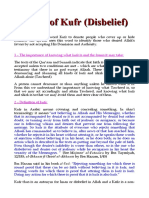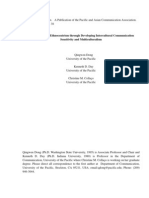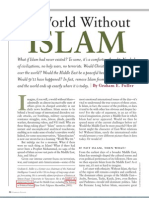Globalization Religion Paper
Globalization Religion Paper
Uploaded by
Jessie Yancey-SiegelCopyright:
Available Formats
Globalization Religion Paper
Globalization Religion Paper
Uploaded by
Jessie Yancey-SiegelCopyright
Available Formats
Share this document
Did you find this document useful?
Is this content inappropriate?
Copyright:
Available Formats
Globalization Religion Paper
Globalization Religion Paper
Uploaded by
Jessie Yancey-SiegelCopyright:
Available Formats
Jessie Yancey-Siegel
Globalization and Religion The interplay of religion and globalization over the years has been and currently is a controversial and contested subject. Many say that globalization is a relatively new phenomenon, only having emerged in the last century. Yet, religion, a major facet of life for every culture and area of the world, has been spread from continent to continent for centuries and has become truly "globalized". As Sudhir Kale puts it simply in his article Spirituality, Religion, and Globalization, "the earliest knowledge to traverse national borders has mainly been of the spiritual kind" (Kale, p. 96). Through immigration and the inter-connectedness of society, religions such as Christianity, Judaism, Islam, Buddhism, and Hinduism have been spread throughout the globe. This same force of globalization has both aided in the spread of and poses a threat to religion. Along with this threat generated by globalization have come conflicts between proponents for globalization and their religious counterparts. Many factors have affected the global spread of religion. Imperial and colonial endeavors of multiple countries incorporated a desire to spread religious ideals in the colonized country. For example, the Spanish exploration of South America was marked by a strong motivation for the spread of Christianity. British imperialism in Africa aided in the spread of Christianity within the continent. Islam was spread throughout Southern Europe, Northern Africa, the Middle East, and other regions by Muslim Conquests as well as Arab traders. Another force in the spread of religious beliefs, particularly Christianity, is the distribution of missionaries throughout parts of Asia, South America, Africa, and other
parts of the globe. This 'export' of religious ideologies has been aided by the exchange of religious figures such as priests, monks, and mullahs. The exchange of eastern and western religious ideologies is a dynamic that is widely studied, as it plays an important role socially, culturally, and politically in the world. The presence of Western missionaries in Asia has led to the spread of Western religions in the East. For example, the Christian Evangelical Movement, which was born out of the Western society, has been widely outsourced to the East. Seventy percent of Evangelical churches are in non-Western countries today, compared to thirty percent in 1970 (Kale, p. 103). In terms of east to west, eastern spiritual practices such as yoga and meditation have been introduced and popularized in the Western world, as well as eastern religions such as Buddhism, Islam, and Hinduism. In terms of the United States, this rise in popularity of Eastern religion is due in part to changes in immigration laws in the 1960s that admitted more Eastern missionaries into the country. One negative effect of globalization is deterritorialization. In this age of increased migration and cultural imperialism, it becomes harder to identify with a certain ethnic group or region. Kale explains that the indistinguishability of national borders (due to globalization), "poses a threat to the traditional collective identities of many people, which in turn causes them to turn to religion to reclaim those identities" (Kale, p. 98). A person's identification with a religion plays an important role in the construction of a new "cognitive map" through which the individual can locate themselves in the confusing and multidimensional setting generated by globalization. In this way, religion can be seen as an avenue of reterritorialization. Yet, deterritorialization also poses a threat to religions themselves. Key components that have defined all world religions such as sacred time,
space, and people face a threat of extinction by globalization. Place and nation once bound religious followers together, but in this globalized world that is becoming more difficult to do. In fact, the term "globalized religion" refers to the possibility that particular religions are no longer identifiable with a specific ethnic group or nation. Meanwhile, other aspects of globalization strengthen religion. Technology, which has become more advanced and critical to societal development in our globalized world, has aided in this crisis posed to religion. Many religious followers have become reconnected through modern forms of communication, such as radio, television, and the newest development of the internet. The Evangelical branch of Christianity is one example of a religious group that has harnessed the power of the television to spread its beliefs and connect its followers together in the form of "televangelism". Social networking websites such as Facebook and other online spaces provide a way for a community of believers to converse and share virtually; yet, at the same time, the absence of physical connectedness causes followers to become more isolated and privatized. Clearly, different aspects of globalization have either positive or negative effects on religion. The largest and most significant threat to religion in terms of globalization could be considered to be secularism. Secularism is a whole new ideology that can be defined as, "being separate from religious or spiritual connection or influence" (Dictionary.com). Many believe that secularization, a process that would led to the eventual extinction of religion, will be the outcome of modernization and globalization, due to the spread of scientific knowledge and the light of reason. At times throughout history, religion has lost some of it's power and influence. Yet, it continually resurges as a strong force, maybe even as a reaction to globalization, as it provides a way for people to identify with a particular group in an time
of loss of identity and migration. The idea of secularism has been strengthened in the past two decades though, promoted primarily by the Western World, and specifically the United States. As the United States becomes a stronger force of cultural imperialism, influencing the younger generations in non-western countries, secularism is becoming more of a threat to religious groups and those seeking to preserve their religious cultural traditions. Many resistors to globalization and anti-globalization activists have been those of religious groups, most notably Islamist extremist groups, neo-Confucians, and revivalist Hindus (Kurth, p. 5). These groups tend to see the United States as the promoter of globalization leading to secularization. Secularization leads to activities and feelings in opposition to the United States and the West in general. Islamist extremist and fundamentalist groups in particular pose a large threat to Western society, as they continue to become world-wide and inter-connected through forms of communication brought about by globalization. Islam is the fastest growing religion in the world and is second largest to Christianity. Many people tend to identify Islam solely with Arabs, yet, it is becoming more of a universal and globalized religion, with followers all around the globe. Ironically, the the population of Muslim converts is growing in the West, signifying the clash of ideologies and cultures brought about by globalization. In the U.S, native-born Muslims comprise 35% of the American Muslim population; of those 35%, 21% are converts to Islam (Benlafquih, Suite101.com). The majority of Muslims are not extremists and simply practice the religion. Yet, a small subset of the religion, in response to the growing Western influence in many countries with traditional Muslim ties, has responded in a more violent, aggressive manner in the form of terrorist groups. Al Queda, well-known as being the terrorist organization responsible for
the September 11th attacks on the United States, is a group that has formed partly in response to the increasing westernization of Islam-dominated societies. Al Queda and other terrorist networks believe that western modes of modernization have failed to end poverty in the Middle East and have promoted secularism, rather than religion in their own societies (Steger, p. 122). Osama Bin Laden, the leader of Al Queda, and his followers, seek to globalize a "pure" and "authentic" form of Islam. This process is known as "Jihadist Globalism," and is actually contradictory to the beliefs of terrorist groups who claim to be fighting against the forces of globalization. The terrorist groups rely on modern communication, transportation, international banking systems, and other products of globalization. This paradox will be interesting to observe in the coming years. As our world seems to continually "shrink" due to the forces of globalization, religion will continue to face many challenges as well as opportunities. The conflict between those who seek to modernize and advance the world through globalization, and those who wish to hold onto their traditions and practices will play out in many interesting ways.
Works Cited
1. Benlafquih, Christine. "American Muslim Statistics." Suite101. March 24, 2008. Web. December 2, 2009. <http://americanaffairs.suite101.com/article.cfm/american_muslim_statistics>.
2. Kale, Sudhir. "Spirituality, Religion, and Globalization." Journal of Macromarketing. 24.92 (2004): 92, 98, 103.
3. Kurth, James. "Religion and Globalization." Foreign Policy Research Institute. 7.7 (1999): 5
4. "Secular." Dictionary. December 1, 2009. <http://dictionary.reference.com/browse/secular>
5. Robertson, Roland. God and Globalization. Harrisburg, Trinity Press International, 2000.
6. Steger, Manfred. Globalization. New York: Oxford University Press, 2009.
You might also like
- Assess The View That For Minority Ethnic Groups, The Practice of Religion and Membership of Religious Groups Is Mainly A Form of Cultural Defense.Document3 pagesAssess The View That For Minority Ethnic Groups, The Practice of Religion and Membership of Religious Groups Is Mainly A Form of Cultural Defense.Basil36958100% (1)
- A Message To The Muslim Prisoner - Shaikh Abdullah JarraAllahDocument19 pagesA Message To The Muslim Prisoner - Shaikh Abdullah JarraAllahMountainofknowledgeNo ratings yet
- Types of KufrDocument8 pagesTypes of KufrTheEmigrantNo ratings yet
- Contemporary ResearchDocument19 pagesContemporary ResearchLoudy Rose Villareal-VistaNo ratings yet
- Anemia in The Neonate The Differential Diagnosis and TreatmentDocument5 pagesAnemia in The Neonate The Differential Diagnosis and TreatmentleslyjanetNo ratings yet
- Vitamin KDocument16 pagesVitamin KGusti Arya YunediNo ratings yet
- Lipids: CH403 Gayod, JiannaDocument3 pagesLipids: CH403 Gayod, JiannaCASTER JOSH RAMOSNo ratings yet
- LipidDocument80 pagesLipidMirza Salman BaigNo ratings yet
- FORMAL REPORT LipidDocument14 pagesFORMAL REPORT LipidSaraSaraswatyNo ratings yet
- BS 3Document60 pagesBS 3himanshu_agraNo ratings yet
- Letter of TransmittalDocument9 pagesLetter of TransmittalTuhin KhanNo ratings yet
- Religion, Culture and Identity PDFDocument296 pagesReligion, Culture and Identity PDFDarshan KanganeNo ratings yet
- Colonialism and The Middle EastDocument5 pagesColonialism and The Middle EastacoonrodNo ratings yet
- Effect of Globalization On Indian SocietyDocument8 pagesEffect of Globalization On Indian SocietyAbhishek Nath TiwariNo ratings yet
- Bio Chemistry: Core Unit #1 - Review and IntroductionDocument28 pagesBio Chemistry: Core Unit #1 - Review and Introduction0921pyNo ratings yet
- 1.05 Biochemistry Trans - Coenzyme. Cofactors. Prosthetic Grps TRANS v2Document12 pages1.05 Biochemistry Trans - Coenzyme. Cofactors. Prosthetic Grps TRANS v2April AramNo ratings yet
- Folic AcidDocument4 pagesFolic AcidBal Ri MekoleuNo ratings yet
- OsteomalaciaDocument28 pagesOsteomalaciaReginette Pisalbo ChanNo ratings yet
- Ecumenism and InterDocument2 pagesEcumenism and Inter'Rohith MuhundanNo ratings yet
- Vitamin C: World's Healthiest Foods Rich in VitaminDocument12 pagesVitamin C: World's Healthiest Foods Rich in VitaminGusti Arya YunediNo ratings yet
- Lesson 10Document13 pagesLesson 10armin509No ratings yet
- When To Worry in The Middle EastDocument13 pagesWhen To Worry in The Middle Eastnooreman121No ratings yet
- Japan Before The European PowerDocument4 pagesJapan Before The European PowerJemimah A. AlgarNo ratings yet
- Outline: Prepared by Andrea D. LeonardDocument57 pagesOutline: Prepared by Andrea D. LeonardGion LuisNo ratings yet
- Colonialism and TraditionsDocument2 pagesColonialism and Traditionsjake dalsaNo ratings yet
- An Alternative Perspective On The DeathDocument22 pagesAn Alternative Perspective On The DeathRandall DenostaNo ratings yet
- Religion and GlobalizationDocument11 pagesReligion and GlobalizationVicenta MaguddayaoNo ratings yet
- THE PHILIIPPINES: The Past Revisited by Renato ConstantinoDocument8 pagesTHE PHILIIPPINES: The Past Revisited by Renato ConstantinoLOIS ANNE RAZONNo ratings yet
- S1 Hippocratic Oath Seminar and Reading NotesDocument7 pagesS1 Hippocratic Oath Seminar and Reading NotesTaraSubba1995No ratings yet
- Globalization or Globalisation Is The Process of Interaction and Integration Between PeopleDocument9 pagesGlobalization or Globalisation Is The Process of Interaction and Integration Between PeopleVinvinRomulo100% (1)
- Lipid Chemistry: BiochemistryDocument14 pagesLipid Chemistry: BiochemistryManila Med0% (1)
- Vitamin EDocument2 pagesVitamin EPriscilia FooNo ratings yet
- Vitamin E: World's Healthiest Foods Rich in VitaminDocument12 pagesVitamin E: World's Healthiest Foods Rich in VitaminGusti Arya YunediNo ratings yet
- Biochemistry: Daniel D. Menorca, M.DDocument9 pagesBiochemistry: Daniel D. Menorca, M.DCatherine G. BorrasNo ratings yet
- Chapter17 Lipids Textbook PowerpointsDocument56 pagesChapter17 Lipids Textbook PowerpointsqaisarNo ratings yet
- The Hippocratic OathDocument2 pagesThe Hippocratic OathbirdysmileNo ratings yet
- The Hippocratic OathDocument2 pagesThe Hippocratic OathEkuseru ShinNo ratings yet
- Hippocratic Oath Modern Version PDFDocument1 pageHippocratic Oath Modern Version PDFAnonymous WysrHtMNo ratings yet
- Vitamin and Mineral ChartDocument9 pagesVitamin and Mineral ChartAna EchavezNo ratings yet
- The Hippocratic OathDocument2 pagesThe Hippocratic OathSaxon RidgeNo ratings yet
- Electron Transport Chain ExplainedDocument9 pagesElectron Transport Chain Explainedmaria genioNo ratings yet
- Vitamin B12 ImportanceDocument13 pagesVitamin B12 ImportanceabmopalhvacNo ratings yet
- CoenzymesDocument14 pagesCoenzymessmollorenaNo ratings yet
- The Importance of Selenium To Human HealthDocument9 pagesThe Importance of Selenium To Human HealthIrma Melyani PuspitasariNo ratings yet
- Food SupplimentsDocument7 pagesFood SupplimentsTania BhattacharjeeNo ratings yet
- Vitamin HDocument7 pagesVitamin Harulsidd74No ratings yet
- Fat-Soluble Vitamins Assignment) EdittedDocument33 pagesFat-Soluble Vitamins Assignment) EdittedDianzerShengNo ratings yet
- Martin L. Martin Luther KingDocument9 pagesMartin L. Martin Luther Kingjesba_peace100% (1)
- 5 MineralsDocument17 pages5 Mineralsعوض الكريمNo ratings yet
- Antioxidants in Health and DiseaseDocument73 pagesAntioxidants in Health and DiseaseAbhimanyu DeoraNo ratings yet
- Lecture 25Document7 pagesLecture 25Vatshalla100% (1)
- Folic Acid PDFDocument2 pagesFolic Acid PDFmohammadNo ratings yet
- Group 2 LIPIDS Formal Written ReportDocument7 pagesGroup 2 LIPIDS Formal Written ReportmiallyannaNo ratings yet
- The Impact of Globalization On Women in IndiaDocument6 pagesThe Impact of Globalization On Women in IndiajoesylvineNo ratings yet
- Solution Brown Solution: Sample Used Time Oxidized Apple Banana Potato GuavaDocument7 pagesSolution Brown Solution: Sample Used Time Oxidized Apple Banana Potato GuavaLaelannie MagpayoNo ratings yet
- Ni Nyoman Ayu Dewi Dept. of Biochemistry, Faculty of Medicine Udayana University Ayu - Dewi@unud - Ac.idDocument37 pagesNi Nyoman Ayu Dewi Dept. of Biochemistry, Faculty of Medicine Udayana University Ayu - Dewi@unud - Ac.idWida Utami100% (1)
- EthnocentrismDocument12 pagesEthnocentrismWinu JacobNo ratings yet
- Comparative AnalysisDocument14 pagesComparative AnalysislorriejaneNo ratings yet
- Federis-3a-Act 1 Ra 1425Document5 pagesFederis-3a-Act 1 Ra 1425Faye Domini FederisNo ratings yet
- Biochemistry of Liver and KidneyDocument24 pagesBiochemistry of Liver and KidneyAnastasiafynnNo ratings yet
- Contempo World Reading Material Final - 1Document14 pagesContempo World Reading Material Final - 1Marlon NotaNo ratings yet
- Religion and Globalization: Benefits and ChallengesDocument5 pagesReligion and Globalization: Benefits and ChallengesPutri OktavianitaNo ratings yet
- Sherman JacksonDocument29 pagesSherman JacksonefevianNo ratings yet
- Assalamu Alayka: Maher ZainDocument4 pagesAssalamu Alayka: Maher Zainnurul fadhilahNo ratings yet
- Sir Syed Ahmad Khan Was Born OnDocument2 pagesSir Syed Ahmad Khan Was Born OnSchehryar A. AghaNo ratings yet
- Draf Absen Semester I 2022-2023Document183 pagesDraf Absen Semester I 2022-2023DADAN SORANA, STNo ratings yet
- Twelve Imams - WikipediaDocument24 pagesTwelve Imams - WikipediaMosrifa MarlonNo ratings yet
- A World Without IslamDocument8 pagesA World Without IslamHassan Jalil67% (3)
- Skrip Pengacara Perhimpunan Dalam Bahasa InggerisDocument7 pagesSkrip Pengacara Perhimpunan Dalam Bahasa InggerisNaDirah BahariNo ratings yet
- The Institution of Naqibul Eshraf in Ottomans (Sayyids in Ottoman Empire)Document2 pagesThe Institution of Naqibul Eshraf in Ottomans (Sayyids in Ottoman Empire)Ruhi DevranNo ratings yet
- An Islamic Perspective On Public Administration and Official EthicsDocument15 pagesAn Islamic Perspective On Public Administration and Official EthicsUshna AaizNo ratings yet
- FORM CEK KKM Genap 2021-2022Document53 pagesFORM CEK KKM Genap 2021-2022ronie aprilioNo ratings yet
- Islam and ModernismDocument92 pagesIslam and ModernismAyesha GhazaliNo ratings yet
- Introduction To IslamDocument25 pagesIntroduction To IslamIon CreusNo ratings yet
- Hijab VeilDocument200 pagesHijab VeilgameswtsNo ratings yet
- 2018 Operational Calendar PDFDocument1 page2018 Operational Calendar PDFShiblee NaumaniNo ratings yet
- PIAIC Entrance Test - Karachi Merit Rank List - BlockchainDocument54 pagesPIAIC Entrance Test - Karachi Merit Rank List - BlockchainrellikmasNo ratings yet
- Explanation of Hadith 14 From The Arbaeen An Nawawi. Part One Adultery in IslamDocument44 pagesExplanation of Hadith 14 From The Arbaeen An Nawawi. Part One Adultery in IslamskhananiNo ratings yet
- Masail E Sajda Sahw TransliterationDocument112 pagesMasail E Sajda Sahw TransliterationRafat BagwanNo ratings yet
- Night Dhikr - Ramadan 1445Document42 pagesNight Dhikr - Ramadan 1445liabthNo ratings yet
- Islamic Concept of Polygamy, Its Benefits and Impact On SocietyDocument8 pagesIslamic Concept of Polygamy, Its Benefits and Impact On Societyxtylish.tu420No ratings yet
- AS1610 - Tasheelul Tareekh (NBL)Document4 pagesAS1610 - Tasheelul Tareekh (NBL)Abdul GhaffarNo ratings yet
- Aligarh MovementDocument8 pagesAligarh MovementKishalay ChakmaNo ratings yet
- Grade 3Document4 pagesGrade 3Shai HusseinNo ratings yet
- Abu Dharr Al-GhifariDocument4 pagesAbu Dharr Al-GhifariRahbarTvNo ratings yet
- Umars View of KhalidDocument4 pagesUmars View of KhalidAishaNo ratings yet
- Basics Religious EducationDocument382 pagesBasics Religious EducationNasirYacoobNo ratings yet
- Reasonable Doubt in Islamic LawDocument55 pagesReasonable Doubt in Islamic LawNurulhikmah RoslanNo ratings yet
- Istikhara Dua Ka Tarika All TranslationsDocument9 pagesIstikhara Dua Ka Tarika All TranslationsAl Imran100% (1)
- Haqooq Ul IbadDocument15 pagesHaqooq Ul IbadZkmKhan0% (3)

























































































